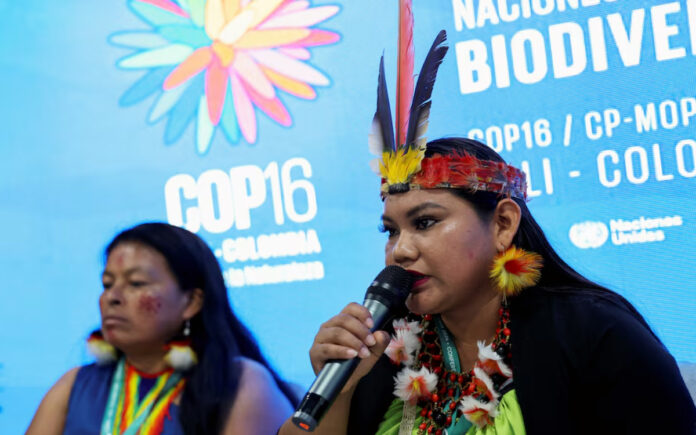Cali, Colombia: Indigenous environmental defenders in Ecuador are increasingly vulnerable to threats and violence as the country battles escalating crime, activists revealed at the U.N. COP16 nature talks in Colombia this week. With nearly 200 countries represented in Cali, the summit aims to build on the Kunming-Montreal Biodiversity Framework of 2022, a landmark agreement that seeks to halt environmental destruction by 2030, including heightened protections for environmental defenders.
Despite these objectives, Ecuadorian Indigenous activists attending the summit expressed concern over worsening conditions for their communities. “It’s become a tense and terrible problem in Ecuador,” said Juan Bay, president of the Waorani Indigenous community. Bay explained that threats have surged since Ecuador approved a 2023 referendum banning oil drilling in parts of the Amazon rainforest.
Ecuador’s situation mirrors broader concerns in the region, with host country Colombia frequently cited as the most dangerous place in the world for environmental and land rights activists; dozens of defenders are killed there annually. Ecuador, meanwhile, is grappling with a wave of violence linked to organized crime, prompting President Daniel Noboa to declare a state of internal armed conflict earlier this year and designate almost two dozen gangs as terrorist groups.
At COP16, delegates discussed establishing a monitoring system for killings of environmental defenders, but activists expressed concerns that the proposed measure lacks effectiveness. “Unfortunately, that indicator being discussed is optional and binary, which means that governments will only say, ‘Yes, we’re doing it,’ or ‘No, we’re not doing it,’” noted Natalia Gomez, a climate policy advisor for the advocacy group EarthRights.
Also Read | North Korea Pledges Continued “Self-Defense” Amid U.S.-South Korea Tensions
According to U.N. data, Ecuador has yet to report its specific actions to safeguard environmental defenders, and advocates are calling for greater accountability. “Ecuador has seen an increase in threats,” confirmed Astrid Puentes, the U.N. special rapporteur on the right to a healthy environment. Puentes emphasized the need for Ecuador’s government to uphold environmental protection standards and implement effective measures to protect individuals facing threats.
Also Read | U.S. Adjusts Military Presence in Middle East with B-52 and Warship Deployments
Representatives from Ecuador’s Indigenous organizations, such as Jhajayra Machoa of CONFENIAE, the primary alliance of Indigenous groups in Ecuador’s Amazon region, highlighted the profound impact of these threats on their communities. “It’s very hard to face this situation,” Machoa remarked, underscoring the climate of fear gripping Indigenous defenders.



